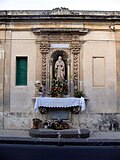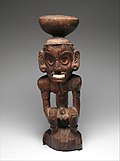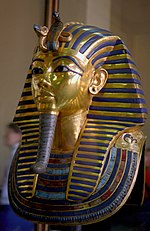The veneration of the dead, including one's ancestors, is based on love and respect for the deceased. In some cultures, it is related to beliefs that...
64 KB (7,961 words) - 16:20, 18 November 2024
Veneration (Latin: veneratio; Greek: τιμάω timáō), or veneration of saints, is the act of honoring a saint, a person who has been identified as having...
33 KB (3,763 words) - 13:37, 2 November 2024
ancestor veneration, also called Chinese ancestor worship, is an aspect of the Chinese traditional religion which revolves around the ritual celebration of the...
20 KB (2,367 words) - 02:05, 7 November 2024
Canaanite religion (redirect from List of Canaanite deities)
practices included animal sacrifice, veneration of the dead, and the worship of deities through shrines and sacred groves. The religion also featured a complex...
39 KB (4,656 words) - 07:36, 20 November 2024
Festival Skull art Thursday of the Dead Veneration of the dead Foxcroft, Nigel H. (October 28, 2019). The Kaleidoscopic Vision of Malcolm Lowry: Souls and...
81 KB (9,128 words) - 19:47, 10 November 2024
and fate deities Sailor Saturn Veneration of the dead "Anubis - Anubis AKA Inpu, Anupu, or Ienpw". Archived from the original on 2012-10-26. Retrieved...
29 KB (3,602 words) - 19:27, 1 November 2024
Sámi shamanism (section List of deities)
multitude of spirits. Sámi traditional beliefs and practices commonly emphasizes veneration of the dead and of animal spirits. The relationship with the local...
10 KB (1,174 words) - 05:32, 16 November 2024
Zemi (category Veneration of the dead)
sculptural object housing the spirit, among the Taíno people of the Caribbean. Cemi’no or Zemi’no is a plural word for the spirits. Taíno religion, as...
8 KB (772 words) - 03:51, 12 September 2024
Funerary cult (category Anthropology of religion)
of religious teaching and practice centered on the veneration of the dead, in which the living are thought to be able to confer benefits on the dead in...
6 KB (832 words) - 14:56, 18 November 2024
Bhadra (Hindu calendar) (category Months of the Hindu calendar)
the main holiday of the year in Maharashtra. Per the Shaka calendar, the dark fortnight (Krishna Paksha) of Bhadrapada is reserved for the veneration...
4 KB (300 words) - 01:30, 23 October 2024
Apple bobbing (redirect from Bob the apple)
of bobbing of apples is the game snap apple or apple on a string, in which apples are hung from the ceiling and contestants jump to take bites - the winner...
8 KB (690 words) - 20:47, 5 November 2024
Traditional African religions (redirect from Persecution of African Religions)
lower gods, sometimes including a supreme being, as well as the veneration of the dead, use of magic, and traditional African medicine. Most religions can...
51 KB (5,868 words) - 22:18, 9 November 2024
Double Ninth Festival (redirect from Festival of Climbing Heights)
The Double Ninth Festival is a traditional Chinese holiday observed on the ninth day of the ninth month in the Chinese calendar. According to Wu Jun, it...
12 KB (1,054 words) - 23:44, 11 October 2024
Bantu religion (section Diaspora in the Americas)
in an amount of higher and lower gods, sometimes including a supreme creator or force, belief in spirits, veneration of the dead, use of magic and traditional...
26 KB (3,174 words) - 09:15, 1 November 2024
Lunar deity (redirect from God of the moon)
deity who represents the Moon, or an aspect of it. These deities can have a variety of functions and traditions depending upon the culture, but they are...
7 KB (704 words) - 17:58, 11 October 2024
Saturday of Souls Veneration of the dead Veneration of the saints One or more of the preceding sentences incorporates text from a publication now in the public...
53 KB (7,205 words) - 19:35, 6 November 2024
Ra (category Kings of the gods)
present in the Book of the Dead of the 3rd Intermediate Period. He can be seen sitting on his throne in the Book of the Dead of Nedjmet, Padikhons, Nestanebetisheru...
27 KB (3,201 words) - 01:44, 4 November 2024
of indigenous religions that are an integral part of traditional culture. These religions are mainly types of animism and veneration of the dead. The...
22 KB (1,075 words) - 21:18, 19 May 2024
Egyptian: mꜥnḏt) or the Boat of Millions of Years (Ancient Egyptian: wjꜣ-n-ḥḥw), and the vessel he used during the night was known as the Mesektet (Ancient...
5 KB (545 words) - 22:49, 4 November 2024
Ammit (redirect from Eater of the Dead)
"Devourer of the Dead"; also rendered Ammut or Ahemait) was an ancient Egyptian goddess[clarification needed] with the forequarters of a lion, the hindquarters...
25 KB (2,417 words) - 23:10, 13 November 2024
Menhit (category Pages using the WikiHiero extension)
(2018-08-28). The Ancient Egyptian Book of the Dead: Prayers, Incantations, and Other Texts from the Book of the Dead. Crestline Books. ISBN 978-0-7603-6443-7...
4 KB (430 words) - 22:53, 13 October 2024
veneration in Wiktionary, the free dictionary. Veneration may refer to: Veneration of the dead Veneration of Mary in the Catholic Church Veneration of...
215 bytes (60 words) - 14:38, 2 March 2021
Fetishism (category Anthropology of religion)
the bear represented the shaman, the buffalo was the provider, the mountain lion was the warrior, and the wolf was the pathfinder, the cause of the war...
16 KB (1,878 words) - 14:20, 9 October 2024
Profane (religion) (redirect from The sacred and the profane)
"secular". The distinction between the sacred and the profane was considered by Émile Durkheim to be central to the social reality of human religion. The term...
10 KB (1,247 words) - 01:49, 30 October 2024
Sarnaism (category Veneration of the dead)
Sarnaism is a religious faith of the Indian subcontinent, predominantly followed by indigenous communities of Chota Nagpur Plateau region across states...
21 KB (1,779 words) - 13:57, 20 November 2024
Kebechet (category Pages using the WikiHiero extension)
"refreshes and purifies" the pharaoh. Kebechet was thought to give water to the spirits of the dead while they waited for the mummification process to...
3 KB (193 words) - 01:47, 17 October 2024
from the syncretism of the Egyptian god Osiris and the Greek god Dionysus. The two deities had been identified with each other as early as the 5th century...
3 KB (305 words) - 05:30, 4 September 2024
explain curses, and their changing uses—from condemning disturbance of the dead to entertaining horror film audiences—suggest that Egyptian curses are...
23 KB (2,908 words) - 11:06, 4 November 2024
Haruspex (category Wikipedia articles incorporating a citation from the 1911 Encyclopaedia Britannica with Wikisource reference)
In the religion of ancient Rome, a haruspex was a person trained to practise a form of divination called haruspicy, the inspection of the entrails of sacrificed...
12 KB (1,353 words) - 12:51, 3 October 2024
Khonsu (category Pages using the WikiHiero extension)
romanized: Shons) is the ancient Egyptian god of the Moon. His name means 'traveller', and this may relate to the perceived nightly travel of the Moon across the sky....
9 KB (935 words) - 00:01, 18 November 2024


























